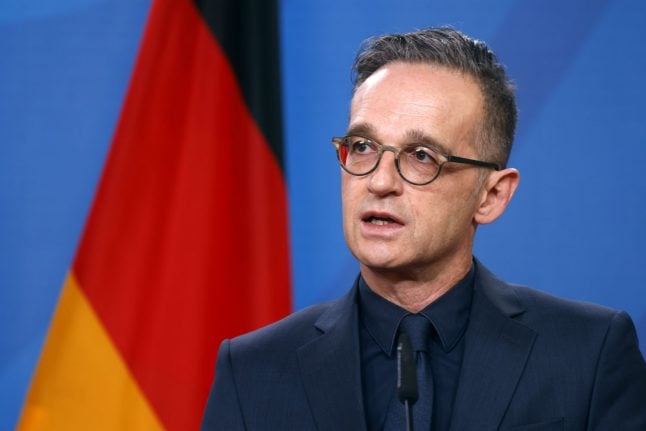German Foreign Minister Heiko Maas on Wednesday urged America's politicians to help maintain “trust” in the electoral system after President Donald Trump prematurely declared victory in the tightly contested race.
“It is important that all politicians who reach people directly, establish trust in the electoral process and the results,” Maas said in a statement, adding that it would be “premature” to comment further given that ballots were still being counted.
“We must now be patient,” said the minister, whose country holds the rotating presidency of the European Union.
Trump had declared himself the winner before all the votes were counted and announced that he wanted to have another count stopped by the US Supreme Court.
READ ALSO: US-German relations 'on life support' after four years of Trump
The German government as a whole did not want to comment on Trump’s statement Wednesday, pointing out that the final result of the election was still missing.
“As long as that is the case, the German government is following everything closely, but it does not comment on the state of affairs,” said government spokesman Steffen Seibert.
'Acting anti-democratically'
However, the Social Democrats (SPD), Left Party (Die Linke), Greens and Free Democrats (FDP) strongly criticised Trump's statement.
“A candidate, even if he is the incumbent president, who calls for postal votes not to be counted any further, is acting anti-democratically”, SPD leader Saskia Esken told the Rheinische Post.
Left leader Bernd Riexinger spoke of a “renewed attack on democracy”, and the Green party politician Reinhard Bütikofer called it an “unprecedented attack”. There had not been anything comparable since the founding of the United States more than 230 years ago, he said.
FDP leader Christian Lindner predicted a “dramatic conflict situation” on public broadcaster ZDF. This could have unforeseeable consequences for the US, but also for the rest of the world, he said.
“A situation will of course arise in which the United States may not be able to act at all on the international level. They will then only deal with themselves.”
The German government's Transatlantic Coordinator, Peter Beyer, expressed concern that violent clashes could occur if the situation is prolonged.
“If it takes time to reach a legally binding decision on the election winner, it is to be feared that confrontations between the two camps will also occur on the streets,” the CDU politician told DPA.
But he added: “I consider the scenario of a civil war to be completely exaggerated.”
The right-wing Alternative for Germany (AfD) was the only party represented in the Bundestag to react cautiously to Trump's premature declaration of victory.
“(Trump's statement) is probably due to the excitement of the election,” party leader Jörg Meuthen told DPA in Berlin, saying that no one needs to worry about the functioning of democracy in the USA.
In Germany, many had hoped for a Biden win. In pre-election polls, a large majority had hoped for the Democratic Party's challenger as US president, with only about one in ten people in favour of Trump.
German-American relations have plummeted to a low point following the election of the the 74-year-old. For four years, he regarded Germany primarily as a rival and not an ally, and even put pressure on it with sanctions.
'We are not prepared for this'
Re-election would catch the German government cold, says CDU foreign policy expert Norbert Röttgen.
“We are not prepared for this,” the chairman of the Foreign Affairs Committee in the Bundestag told ARD television.
If Trump were to remain president for another four years, there would be an increase in everything that had been experienced in the first term of office. “It makes a difference whether you doubt NATO for four years or whether that happens for eight years.”
READ ALSO: Germans 'more worried about Trump than coronavirus'
Beyer stressed, however, that Germany would have to strive for constructive cooperation with the US even if Trump won the elections.
“It would be downright irresponsible of us to definitely retreat into the dung heap if Trump wins,” he said.
Before the election, Maas had announced that, regardless of the outcome, he would approach the US with proposals for a fresh start in transatlantic relations. He spoke of a “New Deal”.




 Please whitelist us to continue reading.
Please whitelist us to continue reading.
Member comments